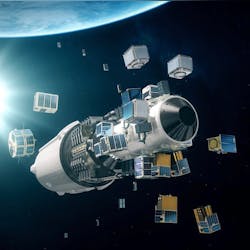Exolaunch to send its largest mission of one ton of smallsats into orbit via SpaceX's Transporter-2 rideshare mission
CAPE CANAVERAL, Fla., - Exolaunch has completed its launch campaign named ‘Fingerspitzengefühl’ by integrating 29 small satellites from the USA, Europe and South America aboard SpaceX’s Falcon 9 rideshare mission scheduled for June 2021. With a combined mass of close to one ton, Exolaunch doubles its mass capacity from SpaceX’s previous rideshare for small satellites, making ‘Fingerspitzengefühl’ its largest mission in terms of payload mass to date.
Exolaunch’s rideshare cluster includes payloads with cutting-edge technologies for IoT, Earth Observation and scientific applications, and satellites from its international customers such as Loft Orbital, NanoAvionics, ICEYE, and the TU Berlin. Exolaunch is also providing flight hardware, separation systems and integration services to support Satellogic's four microsatellites on this mission.
This is the second dedicated rideshare mission of SpaceX’s SmallSat Rideshare Program and also the second of a series of rideshares Exolaunch is manifesting on Falcon 9 as part of a Multi-Launch Agreement the company signed with SpaceX in 2020. On SpaceX’s first record-breaking dedicated rideshare mission Transporter-1 earlier this year Exolaunch launched 30 contracted satellites. For every Falcon 9 launch procured through the Multi-Launch Agreement with SpaceX, Exolaunch ensures comprehensive rideshare mission management, satellite integration and deployment services for its customers.
To maximize payload capacity and cost-effectiveness for its customers of this mission, Exolaunch will use its recent product addition, EXOport, a flexible multi-satellite adapter designed to optimally accommodate microsatellites and cubesats on a single Falcon 9 ESPA port. The company will also utilize its proprietary flight-proven separation systems – CarboNIX, the next generation shock-free separation system for microsatellites, and the EXOpod, Exolaunch’s upgraded cubesat deployer with half a decade of flight heritage, to flawlessly deploy its customers’ satellites into the target orbit.
Starting next year, due to entry of the Reliant orbital transfer vehicle into the space tug market, Exolaunch will be able to meet the most ambitious requirements of its customers wishing to deploy satellite constellations to custom orbits by adjusting altitude, inclination, LTAN/LTDN, and performing orbital phasing. It is designed to deorbit shortly after deployment completion, minimizing the risks of space collisions and reducing orbital debris. Future generations of Reliant will also be able to perform on-demand active debris removal.
